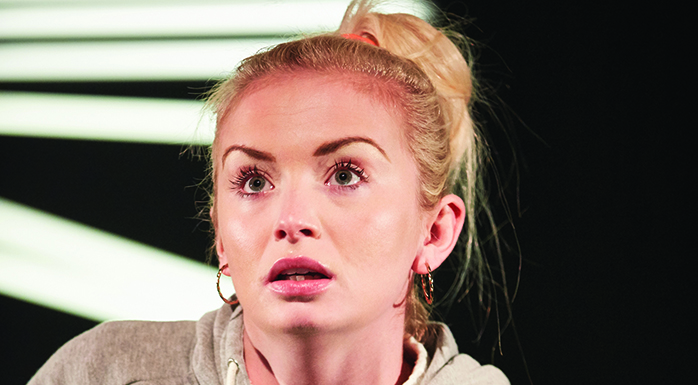@ Traverse Theatre, Edinburgh, until Sat 5 Mar 2016
“What gets me through is knowing I took this pain, and saved all of you from suffering the same.”
Effie is a girl who knows what her audience will think of her. She is fully aware that to most observers she fits all-too-snugly into one of the lowest strata of society: that vocal underclass, “drunk at 11.30am, staggering down Clifton Street”. She could almost have wandered fully formed from the pages of a Niall Griffiths novel. She’s belligerent and confrontational, sprawled in a chair with legs strewn wide in a pose that would have been one of grotesque machismo had she been male. She eyeballs us with naked aggression, and dares us to look away.
It would be a fairly safe bet that not a single audience member took their eyes from the remarkable Sophie Melville for the duration of Gary Owen’s bruising state-of-the-nation monologue. A loose modern retelling of the myth of the sacrifice of Iphigenia, and a microcosmic examination of a nation embattled through recession and austerity, Iphigenia in Splott is a perfect storm of writing and performance. Owen’s adoption of a female voice is utterly convincing, and Melville brings his words to vivid, heart-breaking life.
Effie is incredibly verbose; words spat in a staccato Welsh accent that takes some time to absorb, but one picks up the unspoken sadness and vulnerability between the lines. She mentions her grandmother, but no parents. What has happened? What trauma led her down the path of drunken oblivion and compulsive promiscuity? When Melville goes into earthy poetic details of the one night that changed it all, we’re rapt with the possibility of redemption. Effie’s usual bark softens to a croon at the sensation of not feeling alone anymore; and it’s sentimental in the best possible sense. However, we know it can’t last.
Unfortunately, while Iphigenia in Splott is an incredibly immersive extreme character study, it slightly loses its way by the end as the play’s polemical stance comes to the fore. Effie’s sacrifice for the good of others is rather on-the-nose; lacking the vicious grace of the rest of her tale. Characters rendered beautifully in the imagination by Owen and Melville’s storytelling are cheapened by use as blunt instruments wielded for an explicit political point that was perfectly clear bubbling under in the subtext.
Happily, the slightly anti-climactic ending is nowhere near enough to derail an otherwise exquisite piece that is deservedly growing in reputation and has sold out its short run in Edinburgh. Sophie Melville is nothing short of incredible, and bears the Atlas-level burden of a dense and complex role with the skill of a performer who can wear a character like a tailor-made suit.
